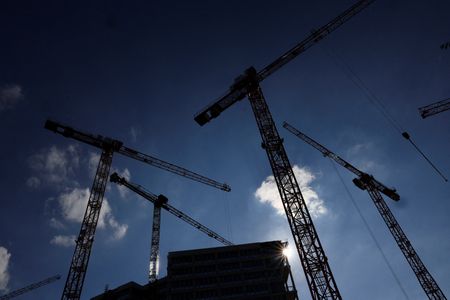By Indradip Ghosh
BENGALURU (Reuters) – German home prices will build on a recent rebound but at a slightly slower pace than expected earlier this year, according to analysts polled by Reuters, as supply remains tight and worsening affordability dents demand.
After a nearly two-year slump, recent data suggest Germany’s real estate sector is recovering, partly on rapidly declining interest rates. Improving overall economic activity and renewed optimism around a 500 billion euro ($568 billion) government infrastructure package are also helping.
But the threat from U.S. President Donald Trump to levy a 50% tariff on goods imported from the European Union, and uncertainty around newly-elected Chancellor Friedrich Merz’s policies, are clouding the overall economic outlook.
Average home prices will increase 3.0% in 2025, compared with 3.5% predicted in a February survey, the May 20-27 Reuters poll of 15 property analysts found. Prices rose 1.9% from a year earlier in the final quarter of 2024, the first annual rise since 2022.
A 3.0% increase was also forecast for next year.
“As house prices are expected to continue to rise, the supply of affordable homes looks set to worsen overall this year,” said Carsten Brzeski, global head of macro at ING.
“After last year’s improvement in affordability, the worsening labour market, increasing house prices and the up-and-down of interest rates have prevented further improvement,” Brzeski added.
“Hence, the recovery of the real estate market will remain subdued.”
The European Central Bank is expected to cut its key deposit rate just once or twice more, after reducing it by 175 basis points since June 2024.
ANNUAL TARGET
There were 251,900 apartments built in Germany last year, down 14.4% from 2023 and far below the government’s annual target of 400,000.
Nine of 15 housing experts responding to a separate question said the supply of affordable homes will be lower in 2025 compared with 2024, including two saying significantly lower.
Five said no change and only one said higher.
All but two of the 15 said affordability for first-time homebuyers would worsen over the coming year, suggesting more will flock to an already-crowded rental market, raising rents even further.
Average urban home rents will increase by between 4% and 5% over the coming year, according to the median view, outpacing the rise in home prices.
“The massive decline in building permits is leading to a general worsening of the housing shortage,” said Sebastian Schnejdar, senior real estate analyst at BayernLB.
“In addition, potential property buyers, who are no longer active on the buyers’ market due to higher interest rates, are increasingly looking for rental apartments or staying in them for longer … the upward pressure on rents – especially in metropolitan regions – will remain high, while the purchase demand for housing will remain relatively low.”
Rising construction costs are adding to concerns, with 12 of 15 analysts saying that building homes will be more expensive this year compared with 2024.
“Looking ahead, pressure on wages in the construction sector is likely to accelerate as a result of crowding-out effects from the German government’s 500 billion infrastructure package … it doesn’t look as if costs will drop,” added ING’s Brzeski.
“We expect construction costs to continue to increase, not only this year but also in 2026 and 2027.”
(Other stories from the Q2 global Reuters housing poll)
($1 = 0.8811 euros)
(Reporting by Indradip Ghosh; Polling by Aman Kumar Soni and Anant Chandak; Editing by David Holmes)











